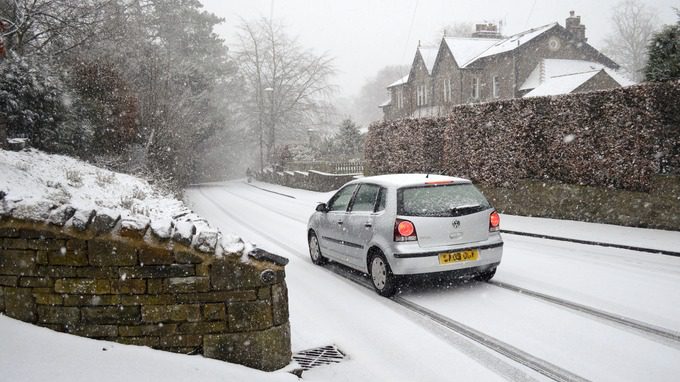Being properly prepared for winter is the best way to face the four coldest months of the year. It’s especially important for the elderly and disabled, who can be vulnerable and can get caught out by cold weather spells and can often struggle to stay safe and comfortable during adverse weather.

This winter, the long-term weather forecast for the UK doesn’t predict extreme weather conditions. The Met Office expects the above average temperatures experienced in 2017 will continue. Although some areas of the UK might witness up to 30% more rainfall than the seasonal average this winter, which could lead to flooding in some areas.
Here are a few important tips to help you prepare for winter.
How to looking after yourself…
Eating
Eating properly is important during cold weather, since your body will consume more calories as it tries to keep warm. You should try to eat at least one hot meal a day and supplement that with other hot drinks throughout the day, at regular intervals. High calorie hot drinks such as hot chocolate or soup is a great way to keep warm and nourished.
Keeping to your five a day (five portions of fruit and vegetables a day), helps your body maintain the right levels of vitamins and minerals – vital for keeping winter colds and infections at bay.
Try to keep three days food and bottled drinking water in your home, in case you are ‘cut off’ by adverse weather or power cuts. Packets and tins are ideal, since they don’t require refrigeration to keep them fresh and have longer sell by dates. Remember to replace them before next winter.
Medication
Always make sure you have a sufficient prescription medication in your home and take up the opportunity to get the flu jab (vaccination). Your GP will be able to confirm your eligibility – if you aren’t eligible, you might choose to buy one from a high street chemist, from around £10. If you medication is running low, you can always ask for extra medication whilst you are at the surgery or seeing your GP.
Movement
Move around, as best you can during the day doing simple activities, carry out light housework. This not only improves circulation but will also make you feel warmer. If you have specific chores to do, try and spread them out during the day.
Communication
It is important to keep in touch. You may not be able to get out and about as easily as usual, so keep in touch with friends and relatives by phone. It’ll keep your spirits up. If you have a mobile phone make sure you keep it charged.
Dressing
The secret to keeping warm is layering your clothes. A thin scarf around your neck will help you keep warm. Make sure you wear a good pair of insulated or fleece lined slippers. If you have a rise and recline chair put your feet up. Air is cooler at ground level and your feet will not only stay warmer but raising your feet improves your circulation. Don’t elevate your feet too high though, you don’t want your blood to flow too far away from your toes, as this will make them cold.
You might also use an electric blanket or hot water bottle. Be sure to follow the instructions to avoid scalding – and don’t use both at once, thus avoiding risk of electric shock. Wheat bags are a safer method of keeping parts of your body warm, simply place in a microwave for 90 seconds and place on the body.
Emergency numbers
It is a good idea to keep a list of specialists such as plumbers; electricians or tradesmen that you may need in an emergency, close to the telephone. Include your utilities providers; your GP, pharmacist and a neighbour who might be able to provide help or assistance in an emergency.
Have an emergency plan
If you live in a rural area or an area prone to flooding, perhaps prepare an overnight bag with a few essentials in case you have to evacuate your home. Include a change of clothing; toiletries, a spare set of keys, small amount of cash and some form of identification.
Do you know where your stopcock is in case you need to turn the water off? Ensure any exposed water pipes are protected or insulated to prevent them from freezing. A large bag of household salt can be used for spreading on steps or paths during icy spells.
Heating your home
Having your central heating boiler serviced and radiators bled once a year before winter, will ensure your system is safe and efficient. Set your central heating thermostat between 18°c and 21°. Remember, it is more efficient and cost effective to keep the room temperature constant than turning the heating on and off, because a cold house takes longer to heat up and will lose temperature faster.
If you have furniture in front of radiators consider moving it so the heat can radiate. Keep internal doors closed when not in use, as this will warm the rest of the house sooner. Draughty windows can be sealed easily and cheaply with products available in most hardware shops. Once it gets dark draw your curtains, as this helps stop any heat escaping.
Its important not to block any vents and whilst homes should have smoke alarms fitted, consider carbon monoxide and or cold alarms too.
Using the car
If you are a car driver, regular servicing or having your car serviced before winter, will maintain not only your car’s roadworthiness but highlight any areas that may need attention.
Make sure you keep a blanket; cold weather clothing, a torch and some non-perishable snacks (e.g. chocolate, peanuts or crisps) in the car, in case of breakdown. Always take your mobile phone and make sure you keep it charged.
Tell people where you’re going
If you do need to drive regularly and away from home, tell someone where you are going and what time you expect to return. Joining a breakdown recovery service can give you piece of mind. Most of all, listen to the weather forecast before you travel and if weather warnings are given, consider whether your journey is really necessary. If you need to go to the shops, most major supermarkets now offer a delivery service so think about staying home and having your daily essentials delivered instead.
The Warm Home Discount Scheme
There is financial support available, ask your energy provider about The Warm Home Discount Scheme, which could provide a £140 saving from your electricity bill this winter. You can receive a discount on your winter electricity bill (between October and March) and if you receive your Cold Weather Payment or Winter Fuel Payment it won’t be affected.
If you qualify, you should receive a letter no later than 30 November 2017 informing you how to apply for the discount, although you may be able to apply directly to your energy provider.
If you’re on a low income or you get certain means-tested benefits your claim may be successful. (Contact the Warm Home Discount Team if you don’t receive the letter if you think you qualify.)
Your electricity supplier will apply the discount to your bill by the end of March 2018.
Tel: 0345 603 9439 Monday to Friday, 8:30am to 4:30pm
Cold Weather Payment
If you receive benefits, you may get a Cold Weather Payment. If the average temperature in your area is recorded as, or forecast to be, zero degrees Celsius or below for seven consecutive days, you’ll get a payment. You’ll receive £25 for each week of very cold weather between 1 November and 31 March.
Further information is available from your local Jobcentre Plus. (Tell your pension centre or Jobcentre Plus office if you think you should have received a Cold Weather Payment but you haven’t – and if you’re getting Universal Credit, contact the helpline instead.)
Universal Credit helpline Telephone: 0345 600 0723
Textphone: 0345 600 0743
Monday to Friday, 8am to 6pm
Winter Fuel Payment
Were you were born before 5 August 1953? If so, you may be eligible to receive support with your heating costs. You could receive between £100 and £300 to help with your heating bills. Most payments are made automatically between November and December. (You should receive your payment no later than 15 January 2018.)
If you do qualify, and are in receipt of a State Pension, or another social security benefit (not Housing Benefit, Council Tax Reduction, Child Benefit or Universal Credit), you should receive your Winter Fuel Payment automatically.
Any payment you receive, shouldn’t affect your other benefits you are entitled to and until 31 March 2018 to claim for winter 2017 to 2018.
If you meet the eligibility criteria but you do not receive your payment you will need to make a claim.
For further information call the Winter Fuel Payment Centre on: 03459 151 515.
Priority Service Register (PSR) – for older and disabled people
The Priority Service Register supports disabled people and offers free energy efficiency advice but also can send your bills in an alternative format (such as large print) or even read your quarterly meter reading if you can’t read it yourself.
If you’re a pensioner; disabled, chronically ill, or have a hearing or visual impairment is simply a matter of contacting your supplier and signing up.
